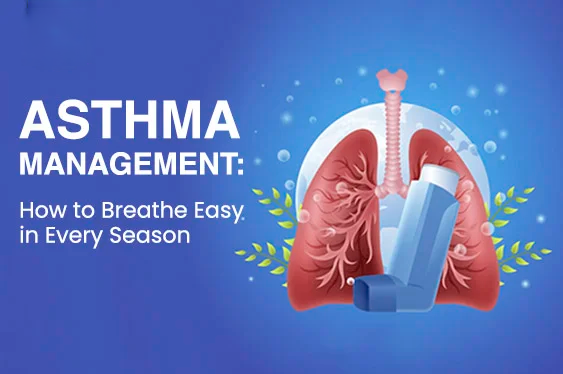Asthma Management Tips: Breathing Easy in Every Season
Living with asthma can be challenging, especially when each season brings its own triggers. From pollen-filled spring days to dry winter air, understanding how to manage asthma year-round is key to maintaining good respiratory health.
This guide provides practical, season-specific tips for managing asthma symptoms and preventing attacks. Whether you’re navigating cold weather, dust allergies, or sudden temperature changes, these strategies will help you breathe easier.
Spring Asthma Management: Dealing with Pollen Allergies
Spring is a beautiful season, but it’s a difficult time for people with allergic asthma. Pollen counts soar, leading to increased wheezing, coughing, and shortness of breath. Try staying indoors during high pollen times, keeping windows closed, and using air purifiers to reduce exposure.
Using your asthma inhaler regularly and as prescribed can also prevent seasonal flare-ups. Speak to a pulmonologist about adjusting medications before spring begins.
Summer Challenges: Coping with Heat and Humidity
Increased humidity and heat during summer can make it harder to breathe. Warm air holds more pollutants and allergens, making asthma symptoms worse. Try to avoid outdoor exercise during peak heat hours and stay hydrated.
If you experience frequent breathlessness during summer, it may be time for an asthma diagnosis review. This ensures your medication is still effective and suited to your current condition.
Fall Awareness: Managing Dust and Mold Exposure
Dust mites and mold spores increase in autumn, especially in closed indoor spaces. Clean bedding regularly, check for mold in damp areas, and vacuum often using a HEPA filter to minimize exposure.
If you’re using a nebulizer for asthma, ensure it’s clean and functioning properly. This helps avoid respiratory infections and maintains effective medication delivery.
Winter Warnings: Handling Cold Air and Infections
Cold weather often brings respiratory infections that can aggravate asthma symptoms. Wear a scarf over your nose and mouth to warm the air before it reaches your lungs and avoid outdoor activity in freezing temperatures.
Consider getting the flu vaccine for asthmatics as part of your winter protection plan. It helps prevent complications from seasonal flu, which can worsen asthma symptoms.
Lifestyle Tips for Year-Round Control
- Maintain an asthma action plan with your doctor
- Track your symptoms in an asthma diary
- Use air purifiers at home
- Avoid known triggers
- Practice breathing exercises and stay active
Effective asthma control means staying informed, adapting to seasonal triggers, and following your treatment plan. Small changes can make a big difference in long-term respiratory health.
Stay one step ahead of seasonal asthma and live your best life – one deep breath at a time.
Visit our Khims Hospital Khammam for personalized asthma care and expert pulmonology services.

